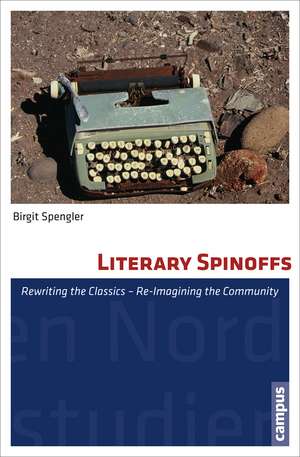Literary Spinoffs: Rewriting the Classics - Re-Imagining the Community: North American Studies, cartea 35
Autor Birgit Spengleren Limba Engleză Paperback – 4 ian 2016
In Literary Spinoffs, Birgit Spengler explores the literary strategies, theoretical dimensions, and cultural implications of contemporary rewritings of nineteenth-century American literary classics. By tapping into powerful, ingrained literary and cultural narratives, literary spinoffs challenge our cultural imagination, revising the ways in which the community constructs itself through stories. Drawing on in-depth case studies of prominent contemporary rewritings, Spengler offers close analyses of the genre’s particular aesthetics and effects, its relationship with other contemporary forms, and the ways it shapes the reading experience. As Spengler shows, the intensely intertextual nature of these works raises questions about the processes of cultural meaning-making and reinvigorates contemporary debates about intellectual property, cultural capital, and high and popular culture.
Preț: 352.01 lei
Preț vechi: 437.79 lei
-20% Nou
Puncte Express: 528
Preț estimativ în valută:
67.36€ • 73.46$ • 56.80£
67.36€ • 73.46$ • 56.80£
Carte indisponibilă temporar
Doresc să fiu notificat când acest titlu va fi disponibil:
Se trimite...
Preluare comenzi: 021 569.72.76
Specificații
ISBN-13: 9783593503110
ISBN-10: 3593503115
Pagini: 500
Ilustrații: 18 color plates
Dimensiuni: 140 x 216 x 33 mm
Greutate: 0.64 kg
Editura: CAMPUS VERLAG
Colecția Campus Verlag
Seria North American Studies
ISBN-10: 3593503115
Pagini: 500
Ilustrații: 18 color plates
Dimensiuni: 140 x 216 x 33 mm
Greutate: 0.64 kg
Editura: CAMPUS VERLAG
Colecția Campus Verlag
Seria North American Studies
Notă biografică
Birgit Spengler is assistant professor of American studies at Goethe University Frankfurt am Main. She is the author of Vision, Gender, and Power in Nineteenth-Century American Women’s Writing, 1860-1900.
Cuprins
Acknowledgements
Introduction
1. Literacy Spinoffs: An Intertextual Gene
1.1 Spinoff Aesthetics: Explicitness and Intensity of the Intertextual Relation
1.2 Oscillation and Good Continuation
1.3 0-2: Text and Context/Text and Matrixes
1.4 The “Dialogic” Involvement with the Pre-Text: Dark Areas and In-/Compatibility of Fictional Worlds
1.5 Spinoffs as Communicative Genre: Dialogue and Dialogics
1.6 Intertextual Contexts
2.Re-Visioning Intertextuality: Models and Debates
2.1 Predecessors: Poststructuralist vs. Descriptive Intertextuality
2.2 Alternative Positions
2.3 A Working Model of Intertextuality in Cultural and Literary Analysis
3. Cultural Work and the Functions of Genre
3.1 Cultural Work
3.2 Exclusion and Inclusion: Spinoffs and/as Participatory Culture
3.3 The Literary Marketplace and Cultural Capital
3.4 Copyrights and Copywrongs: Who “Owns” Culture?
3.5 Revisiting the Nineteenth Century
4. Ahab’s Wife: A Cannibal of a Book?
Ow(n)ing Melville
4.1 Appropriating Melville
4.2 The World as Ship: Mad Hunts, Male Myths
4.3 Re-Writing the Quest: From Soaring Spirit to Social Vision
4.4 The Quill and the Quilt: Art as Social Vision
5. From Playing Pilgrim to Waging War: March
The Return of the Father
5.1 Little Women: Alcott’s Classic?
5.2 Little Women and Colossal Fathers: March’s Pre-Texts
5.3 March’s Civil Wars: Gender, Soul-Wresting, Slavery, and Innocence
6. American Pastorals? Re-Reading Adventures of Huckleberry Finn
6.1 Twain’s Fame: The Hypercanonization of Mark Twain and Huckleberry Finn
6.2 Reading Huckleberry Finn: Hermeneutic Agendas
6.3 My Jim: Huckleberry Finn as Neo-Slave Narrative
6.4 The Bequests of the Fathers: Fatherhood, Inheritances, and the Role of the Past in Finn
Conclusion: Story-Telling, Libraries, Trunks of Books, and the Writing on the Whitewashed Wall
Bibliography
List of Illustrations
Index
Introduction
1. Literacy Spinoffs: An Intertextual Gene
1.1 Spinoff Aesthetics: Explicitness and Intensity of the Intertextual Relation
1.2 Oscillation and Good Continuation
1.3 0-2: Text and Context/Text and Matrixes
1.4 The “Dialogic” Involvement with the Pre-Text: Dark Areas and In-/Compatibility of Fictional Worlds
1.5 Spinoffs as Communicative Genre: Dialogue and Dialogics
1.6 Intertextual Contexts
2.Re-Visioning Intertextuality: Models and Debates
2.1 Predecessors: Poststructuralist vs. Descriptive Intertextuality
2.2 Alternative Positions
2.3 A Working Model of Intertextuality in Cultural and Literary Analysis
3. Cultural Work and the Functions of Genre
3.1 Cultural Work
3.2 Exclusion and Inclusion: Spinoffs and/as Participatory Culture
3.3 The Literary Marketplace and Cultural Capital
3.4 Copyrights and Copywrongs: Who “Owns” Culture?
3.5 Revisiting the Nineteenth Century
4. Ahab’s Wife: A Cannibal of a Book?
Ow(n)ing Melville
4.1 Appropriating Melville
4.2 The World as Ship: Mad Hunts, Male Myths
4.3 Re-Writing the Quest: From Soaring Spirit to Social Vision
4.4 The Quill and the Quilt: Art as Social Vision
5. From Playing Pilgrim to Waging War: March
The Return of the Father
5.1 Little Women: Alcott’s Classic?
5.2 Little Women and Colossal Fathers: March’s Pre-Texts
5.3 March’s Civil Wars: Gender, Soul-Wresting, Slavery, and Innocence
6. American Pastorals? Re-Reading Adventures of Huckleberry Finn
6.1 Twain’s Fame: The Hypercanonization of Mark Twain and Huckleberry Finn
6.2 Reading Huckleberry Finn: Hermeneutic Agendas
6.3 My Jim: Huckleberry Finn as Neo-Slave Narrative
6.4 The Bequests of the Fathers: Fatherhood, Inheritances, and the Role of the Past in Finn
Conclusion: Story-Telling, Libraries, Trunks of Books, and the Writing on the Whitewashed Wall
Bibliography
List of Illustrations
Index
Recenzii
“A literary spinoff is any fictional text that revises, rewrites, or appropriates another (usually canonical) work. Spengler begins by defining these texts as a genre, and then focuses on spinoff novels in the United States from the last twenty years, including such pairings as Ahab’s Wife by Sena Jeter Naslund and Herman Melville’s Moby-Dick; March by Geraldine Brooks and Louisa May Alcott’s Little Women; and both My Jim by Nancy Rawles and Finn by Jon Clinch alongside Mark Twain’s The Adventures of Huckleberry Finn. Rather than merely revising our ideas of the past, literary spinoffs, as Spengler argues, help us reconceptualize the present.”





